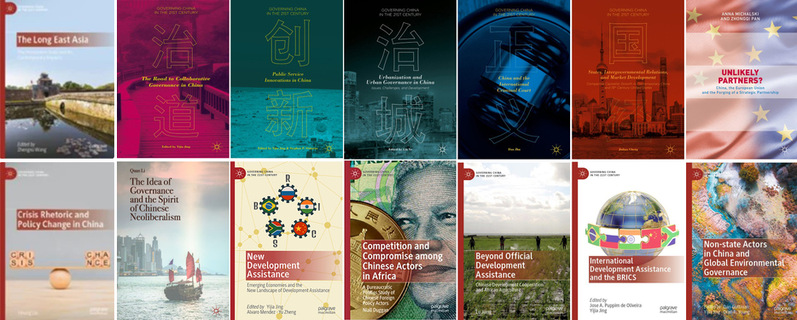
Governing China in the 21st Century
About the series
This series explores domestic and international issues affecting governance in 21st Century China. China is at a critical point in its national growth and facing immense challenges as well as opportunities. The course of its future development will be determined by its capacity to deal with these issues at local and international levels, and to build a sustainable path of development. This series has an inherently interdisciplinary focus looking at issues such as local governance, public policy and administration, social, urban, and nonprofit development, environmental politics, regional diplomacy and international affairs.

Homepage: https://www.springer.com/series/15023
Editors
Published Books
Q & A
Downloads
Yijia Jing
Dr. Yijia Jing is a Chang Jiang Scholar, Seaker Chan Chair Professor in Public Management, Dean of the Institute for Global Public Policy, Co-Director of LSE-Fudan Research Centre for Global Public Policy, and Director of Fudan-Arab Research Centre for Global Development and Governance, Fudan University. He got his BA/MA in Economics from Peking University, MA in Sociology from University of Maryland College Park, and Ph.D. in Public Policy from the Ohio State University. He conducts research on privatization, governance, social organizations, and collaborative service delivery, and publishes on top journals like Public Administration Review, Journal of Policy Analysis and Management, and Governance. He is founding editor-in-chief of the journal Global Public Policy and Governance and a founding co-editor of the Palgrave book series, Governing China in the 21st Century. He is a co-editor of International Public Management Journal, and was an associate editor of Public Administration Review and editor-in-chief of Chinese journal Fudan Public Administration Review. He served as a vice president of International Research Society for Public Management and is the founding president of China-Arab Network of Schools of Public Policy and Administration (CANSPPA).
The Long East Asia. Edited by Zhengxu Wang
Crisis Rhetoric and Policy Change in China. Authored by Yihong Liu
Non-state Actors in China and Global Environmental Governance. Edited by Dan Guttman, Yijia Jing & Oran R. Young
Urbanization and Urban Governance in China: Issues, Challenges, and Development. Edited by Lin Ye
International Development Assistance and the BRICS. Edited by Jose A. Puppim de Oliveira and Yijia Jing
Beyond Official Development Assistance. Authored by Lu Jiang
Competition and Compromise among Chinese Actors in Africa. Authored by Niall Duggan
New Development Assistance. Edited by Yijia Jing, Alvaro Mendez and Yu Zheng
States, Intergovernmental Relations, and Market Development. Authored by Jinhua Cheng
China and the International Criminal Court. Authored by Dan Zhu
The Idea of Governance and the Spirit of Chinese Neoliberalism. Authored by Quan Li
Public Service innovations in China. Edited by Yijia Jing and Stephen Osborne
Unlikely partners? China and the Europeannion. Authored by Anna Michalski and Zhongqi Pan
The Road to Collaborative Governance in China. Edited by Yijia Jing
Here are some questions potential authors may have, and our answers.
1. Can we have edited books included in this series?
Yes. Both sole or co-authored and edited books (65,000-90,000 words) can be included in the series. We also accept mid-length monograph projects (20,000-50,000 words).
2. What is the scope of issues covered?
The focus is on politics, public governance and public affairs in China, including topics related to politics and development, public administration and policy, international relations and diplomacy, as well as socioeconomic issues. If you are not sure, please email the series editors with your book ideas for their opinion.
3. How can I propose a book to the editors?
Please send the book proposal and two or three full chapters (a full manuscript is fine) to the series editors by email. We will let you know within a month if the book proposal can progress to peer review process, based on an evaluation of the theme, structure of the book, and quality of the work. If a proposal is accepted by the series editors, the publisher, Palgrave Macmillan, will arrange the blind peer review.
4. How long does the blind peer review process take?
Depending on the responsiveness of the reviewers, it can take one to three months. After the peer review, the book proposal may be rejected or conditionally accepted.
5. What are the next steps if a proposal is accepted?
The author(s) will sign a contract with Palgrave. You will be contacted by a Commissioning Editor from Palgrave for contract issues. Once the book enters production, a Production Editor from Palgrave will liaison with you to handle manuscript submission and publication. For more details, Download Author Handbook.pdf
6. How long does it take to get a book published?
Proposal review may take 1-3 months. The contract and related issues generally take less than one month.
7. What is the reference style of the series?
Authors shall be consistent in using reference styles like APA, SPSA, and Chicago Styles.
8. How about the use of notes?
Please use endnotes. Notes are used for further explanations, not for references.




